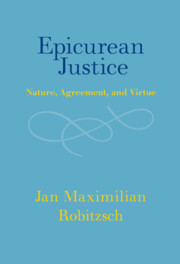Book contents
- Epicurean Justice
- Epicurean Justice
- Copyright page
- Dedication
- Contents
- Acknowledgments
- Introduction
- Chapter 1 The Origin of Justice
- Chapter 2 Contractual Justice
- Chapter 3 Aretaic Justice
- Chapter 4 Moral Psychology
- Chapter 5 Justice and Law
- Chapter 6 Ethical Naturalism
- Chapter 7 Conclusion
- Book part
- Bibliography
- Index Locorum
- General Index
Chapter 4 - Moral Psychology
Published online by Cambridge University Press: 07 March 2024
- Epicurean Justice
- Epicurean Justice
- Copyright page
- Dedication
- Contents
- Acknowledgments
- Introduction
- Chapter 1 The Origin of Justice
- Chapter 2 Contractual Justice
- Chapter 3 Aretaic Justice
- Chapter 4 Moral Psychology
- Chapter 5 Justice and Law
- Chapter 6 Ethical Naturalism
- Chapter 7 Conclusion
- Book part
- Bibliography
- Index Locorum
- General Index
Summary
This chapter argues that while being just is of supreme importance in Epicureanism, obeying the law in all cases is not: the Epicureans allow that laws whose adherence is not useful and whose violation does not entail negative consequences may be violated. In arguing for this claim, the chapter discusses a question that Epicurus posed himself in a work that is no longer extant, namely, whether a sage, an ideal agent, would violate a law, knowing he will escape detection. The chapter provides a detailed suggestion on how to understand Epicurus’ pronouncement, discusses alternative readings that have been advanced by other scholars, and addresses some objections that one could raise against the suggestion of the chapter.
- Type
- Chapter
- Information
- Epicurean JusticeNature, Agreement, and Virtue, pp. 98 - 117Publisher: Cambridge University PressPrint publication year: 2024

